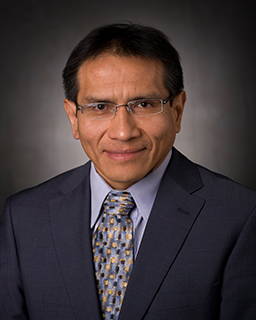Urbina uses Fulbright project to build connection between Penn State, Peru
3/16/2015
UNIVERSITY PARK, Pa. — Julio Urbina is building strong educational ties between Penn State and his native Peru. The Penn State associate professor of electrical engineering was recently awarded a Fulbright Scholarship to teach and conduct research in Peru. While there, he intends to forge a link between the two countries beyond a shared stage of academics.
In March, Urbina will leave State College to teach for a semester at his undergraduate alma mater, the Universidad Nacional de Ingeniería (UNI) in Lima. He will also join two of his graduate students who are helping him build and launch a new radar in Huancayo. Their work will aid in the study of targets such as meteors and plasma irregularities in the Equatorial ionosphere. Additionally, he is overseeing a program that allows 11 undergraduates in Penn State’s College of Engineering to travel to his home country and attend classes at the Universidad de ESAN (UESAN), in Santiago de Surco, Lima. His plan is to establish an active relationship between the two Peruvian universities and Penn State.
“Different cultures have different problems and different ways to solve them,” said Yolian Amaro-Rivera, a second year doctoral student. “Through research and hands-on experience, Dr. Urbina has taught me how to look at problems from a different perspective. And, working on global projects allows you to establish connections with scientists and engineers from different backgrounds and create new collaborations.”
Urbina’s belief in working with various cultures embraces the heart of the Fulbright program: an exchange of persons, knowledge and skills between people in the United States and other countries. While working at UNI, his main focus will be teaching radar remote sensing and software-defined radio through lectures, real-world applications and research while giving undergraduate and high school students a unique opportunity for their academic development.
“I intend to expose Peruvian undergraduate and high school students — in particular underprivileged students — to research in an intuitive manner,” Urbina explained in his Fulbright proposal. “Fostering an environment of curiosity and exploration will help motivate them to pursue advanced degrees anywhere in the world.”
As a child, Urbina grew up in a poor suburb of Lima and was the first in his large family to attend a university. He credits his family and mentors for their support in helping him get through his undergraduate work and seek an advanced degree in the United States. His hope is to do the same for the students he teaches at UNI in order to give back to the university that gave so much to him.
“I believe strongly in mentorship and that encouraging students to be curious and explore ideas will motivate them to pursue advanced degrees,” said Urbina.
Karim Kuyen Ruiz, a master’s degree student who works with Urbina, has been on the receiving end of Urbina’s support. She met him in Lima when she was in charge of operations of the main radar at the Jicamarca Radio Observatory. He was there running an experiment with that radar and asked her if she was interested in assisting him while pursuing a postgraduate career at Penn State. She was, and is now helping him with the PARIS (PSU All-sky Radar Interferometry System) in Rock Springs, near the University Park campus, while going to school.
“The internet has changed the world, people are more global now. I think today, an engineer has to be exposed to working outside the U.S. with new cultures using different designs to solve a problem,” said Urbina.
Ruiz’s own experience affirms Urbina’s belief.
“Working with people from different backgrounds opens your mind and makes you learn fresh points of view for the same situation,” she said.
Ruiz and several fellow graduate students have worked with Urbina in Lima at the Jicarmarca Observatory and now while building PARIS near State College. For Robert Sorbello, another graduate student that works with Urbina, the opportunities his professor has given him have truly enhanced his education.
“The hands-on experience has greatly affected my graduate school experience,” said Sorbello. “In undergraduate studies, hands-on experience is provided but not to the extent of graduate school. During my time in graduate school, I was able to confirm that the theories learned in my courses really contribute to my understanding.”
In addition to his work at UNI and with his graduate students, Urbina will join Amy Freeman, Penn State’s assistant dean of engineering diversity, in bringing 11 less-privileged undergraduate students with diverse backgrounds to Peru to study for three weeks in May at the Universidad de ESAN. UESAN is equipped with state-of-the-art engineering facilities and offers classes in both Spanish and English. The trip will be the first time most of the 11 students travel outside the country, and Urbina believes UESAN has proven to be a good choice for what he hopes will be an annual exchange program between the two universities.
“Dr. Jorge Talavera, the president of Universidad de ESAN is a Penn State alum and was so happy to make this connection between his school and Penn State,” said Urbina. “I was surprised to learn that a lot of the professors there graduated from Penn State and UNI. There is a strong correlation between these schools, and everyone I met seemed thrilled to pilot this program with us.”
In addition to taking courses at UESAN, the undergraduate students will experience the Peruvian culture through tourism, dining and hospitality. The students will also visit UNI and the Jicamarca Radio Observatory.
“I’m so lucky to tie in these projects with my Fulbright project,” said Urbina. “I think this will be a great experience for everyone.”


